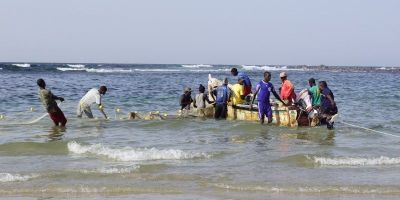Empowering African fisheries against climate change

Dr Nwamaka Okeke-Ogbuafor urges researchers to listen to indigenous communities when it comes to improving their food systems.
AXA Research Fellow Dr Okeke-Ogbuafor has been researching sustainable food systems in various African countries for over seven years.
She collaborates with local fishers, non-governmental organisations (NGOs), community-based organisations (CBOs), in-country researchers, staff from the Ministry of Fisheries and pressure groups to create improvements to fishing systems.
As part of her fellowship with the School of Earth and Environment at the University of Leeds, she is focusing on fisheries in Sierra Leone. The country is facing challenges with hunger, malnutrition and wild fish decline from over-exploitation and climate change.
Restoring autonomy to local communities
Dr Okeke-Ogbuafor aims to restore autonomy to fishers in Sierra Leone so they can continue fishing successfully in the future. It’s essential for her to conduct research in a collaborative way.
This research is about co-creation, co-learning and reverse mentoring between researcher and participants and between participants.
Dr Okeke-Ogbuafor seeks to understand the context of each area, community and fisher to learn about their processes, needs and desires.
They will work together to create solutions that the communities can independently and sustainably use in the future.
Dr Okeke-Ogbuafor discovered that without a thorough understanding of these community contexts, previous recommendations were unsustainable and inappropriate.
For example, one project introduced pond fish farming to rural areas of Sierra Leone, even though the communities didn’t have the resources for their upkeep.
This used valuable land that could have supported other forms of farming and led to increased hunger and malnutrition in the area.
“The transformative consultants who dominate this sector have often bypassed local communities and ignored indigenous ideas. There is a need to shift from consultancy to genuine community engagement,” says Dr Okeke-Ogbuafor.
Her solutions prioritise local contexts and utilise indigenous knowledge.
NGOs, CBOs and other local groups will aid Dr Okeke-Ogbuafor’s understanding of the local communities and identify vulnerable small-scale fishers (SSFs) that may benefit most from collaboration and support.
Overcoming climate change, hunger and malnutrition
This work comes at a time when many fish are migrating to colder waters due to climate change and temperature rise.
Dr Okeke-Ogbuafor identifies further challenges to food security in that most coastal African governments allow foreign nationals to exploit their offshore fish stocks, leaving fewer and fewer wild fish for coastal populations.
According to Action Against Hunger, over half of Sierra Leone’s population doesn’t have enough food. Fish is an essential source of nourishment for them, so the decline in wild fish is a growing concern.
Dr Okeke-Ogbuafor investigates new ways to farm fish, including species and techniques that can withstand high temperatures. She hopes that the solutions that she creates alongside NGOs, CBOs, staff from the Ministry of Fisheries and the local fishers will be signed into community bylaws.




